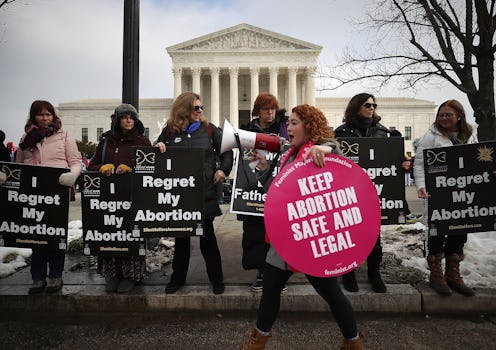
Since 2019 began, states like Utah, Arkansas, Alabama, Georgia, Ohio, Kentucky, Mississippi, and Missouri have passed their own versions of anti-abortion bills. The state of abortion access in Indiana is also sparking concern among those who believe that people should have the right to legal and judgement-free reproductive health care.
On April 24, Indiana's Republican Gov. Eric Holcomb signed the "Dismemberment Abortion" bill into law. The legislation bans medical practitioners from carrying out abortion procedures such as dilation and evacuation (D&E), as Jezebel noted, unless medical experts believe that childbirth for the person could prove to be fatal. The Guttmacher Institute, a research organization focused on reproductive health care, noted in 2017 that the procedure was the most widely used method in second trimester abortions.
The law, which would take effect on July 1, carries severe penalties for those found guilty of performing an abortion. Carrying out the procedure is classified as a Level 5 felony, Rewire reported, and could land the convicted individual in prison for up to six years while also facing a hefty fine of $10,000.
That said, IndyStar reported the Indiana chapter of the American Civil Liberties Union immediately filed a lawsuit against the proposal. In its official statement, the Indiana ACLU chapter argued that the law placed "substantial and unwarranted burden on women’s ability to obtain second-trimester, pre-viability, abortions." A legal battle like that could delay the enactment of the law.
As it stands, according to Jezebel, the Indiana Health Code allows doctors, hospital staff, and health clinic employees to say no to a person seeking an abortion. In April, Gov. Holcomb expanded the state's health code by signing the Senate Enrolled Act 201, which now allows pharmacists and physician assistants to refuse an individual's request for abortion medication, NWI.com reported.
In terms of access to abortion clinics, Indiana residents have options in the single digits. In 2018, The Guttmacher Institute noted that the state presently has nine abortion clinics in total.
Furthermore, The Guttmacher Institute reported that the state of Indiana mandated pre-abortion counseling for people. The organization noted that the nature of such counseling was supposed to eventually discourage people from getting the procedure done.
In addition to these restrictive laws on abortions, the Supreme Court also allowed a fetal remains law to take effect in Indiana on Tuesday. According to The Washington Post, the law requires Indiana residents to either bury or cremate the remains of aborted or miscarried fetuses.
"This court has already acknowledged that a state has a 'legitimate interest in proper disposal of fetal remains,'" according to the Supreme Court's official decision. "The only remaining question, then, is whether Indiana’s law is rationally related to the state’s interest in proper disposal of fetal remains. We conclude that it is, even if it is not perfectly tailored to that end."
On Twitter, the National Women's Law Center decried the Supreme Court decision, saying the law forced a "medically unnecessary" restriction that did not serve public health. Supreme Court Justice Ruth Bader Ginsburg also dissented in a footnote, writing that the Supreme Court was overlooking the repercussions of the fetal remains law, CNN reported.
The justice wrote, "The cost of and trauma potentially induced by, a post-procedure requirement may well constitute an undue burden." By the looks of these various measures, the state of abortion access in Indiana seems troubling, to say the least.